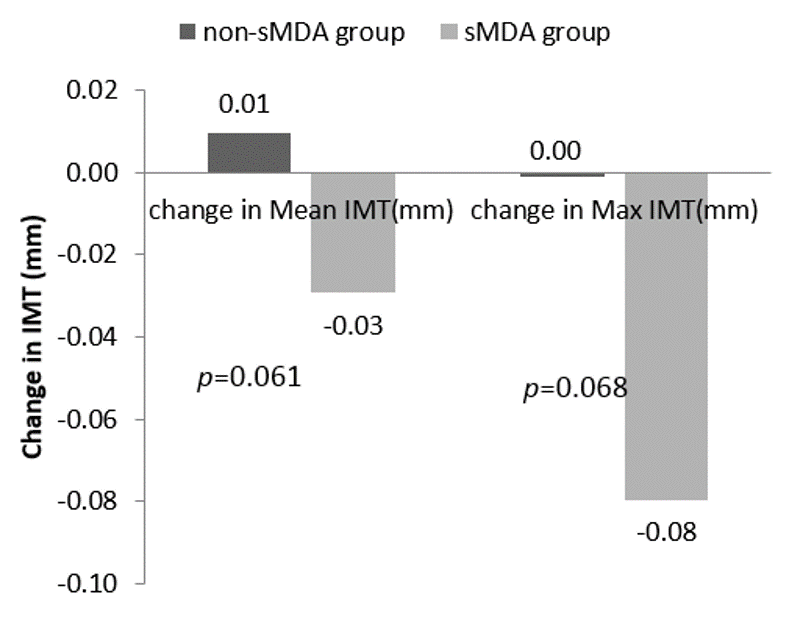Session Information
Session Type: ACR Poster Session C
Session Time: 9:00AM-11:00AM
Background/Purpose:
PsA patients have higher cardiovascular disease risk due to underlying inflammation. While achieving MDA was associated with articular benefits, its effect on CVD risk remained uncertain. This study aimed to investigate the effect of achieving sustained MDA (sMDA) on subclinical atherosclerosis.
Methods:
100 consecutive PsA patients without overt CVD were followed for 2 years with clinical assessment every 4 months. Protocolized treatment aiming at MDA were given. sMDA was defined as achieving MDA over 1 year. Carotid IMT at bilateral distal, bulb and proximal internal carotid artery were evaluated annually using high-resolution ultrasound. Carotid plaque progression was defined as increased number of plaque since baseline.
Results:
54 PsA patients [male:29 (53.7%); 50 +/- 12years] who completed 24-months follow-up were included in this analysis. After 2-year intensive treatment, significantly more patient could achieve MDA [9 (16.7%) at baseline, 35 (64.8%) at 2 years, p<0.001]. 23/54 (43%) patients achieved sustained MDA. Baseline characteristics were comparable between subjects who could or couldn¡¦t achieve sMDA. Numeric differences were observed in change in mean IMT between sMDA and non-sMDA group [-0.03mm +/- 9.8 vs +0.01mm +/- 0.08, p=0.061]. In multivariate analysis, sMDA was associated with less progression of mean IMT [£]=-0.045, 95%CI:-0.082 to -0.009, p=0.017] after adjusting age, gender, disease duration, baseline CRP, PASI, dyslipidemia, NSAIDs use, and bDMARDs use throughout the year. 28/54 (52%) patient had plaque progression. The prevalence of plaque progression was numerically higher in non-sMDA group [19 (61%)vs 9 (39%), p=0.107]. In multivariate analysis, there was a trend suggesting achievement of sMDA might have protective effect on plaque progression [OR=0.2, 95%CI: 0.036 to 1.112, p=0.066].
Conclusion:
Effective suppression of inflammation by achieving sustained MDA may prevent progression of subclinical atherosclerosis in PsA patients.
Funding: We would like to acknowledge the Health and Medical Research Fund (HMRF) for funding support (HMRF Project No. 01120496)
Figures – Change in IMT and plaque progression in subjects with and without achieving sustained MDA
To cite this abstract in AMA style:
Tam LHP, CHENG TH, SHANG Q, Li E, WONG P, ZHU TY, CHANG MM, LEE JJ, WONG CK, LEE PA, Tam LS. Can Achieving Sustained Minimal Disease Activity (MDA) Prevent Progression of Subclinical Atherosclerosis? a Two-Year Prospective Cohort Study in Psoriatic Arthritis [abstract]. Arthritis Rheumatol. 2017; 69 (suppl 10). https://acrabstracts.org/abstract/can-achieving-sustained-minimal-disease-activity-mda-prevent-progression-of-subclinical-atherosclerosis-a-two-year-prospective-cohort-study-in-psoriatic-arthritis/. Accessed .« Back to 2017 ACR/ARHP Annual Meeting
ACR Meeting Abstracts - https://acrabstracts.org/abstract/can-achieving-sustained-minimal-disease-activity-mda-prevent-progression-of-subclinical-atherosclerosis-a-two-year-prospective-cohort-study-in-psoriatic-arthritis/


